The Checker Maven
Uncle Ben's Porch: A Sad Day

Tommy didn't want to go to Uncle Ben's that Saturday for his regular weekly checker lesson, even though the Florida State Scholastic Championships were coming up in just a week, and Tommy was supposed to lead his highly-rated middle school team in the Miami competition.
Tommy's grandfather had passed away only last night, and Tommy was heartbroken, not just for his own sake but for his grieving Mom, who had just lost her father.
Gramps had lived a long and happy life, and Tommy knew that at age 90, the last day would eventually come. But that didn't make things any easier when it finally happened, and Tommy, at age fourteen, had never experienced the loss of a loved one at first hand. But his Mom insisted that he go to Uncle Ben's. "There's little you can do here except watch me cry," she said, "and you've got your tournament coming up. I know you want to be here for me, but your life needs to go on. So shoo!"
Mom managed to smile, even if it was a little forced. Tommy loved her all the more for it, and so he put his notebook in his backpack and walked the half dozen blocks to Uncle Ben's house.
Ben wasn't really Tommy's uncle, of course, but he didn't want to be called "Mr." and "Uncle Ben" seemed like just the right thing. Uncle Ben was a retired professional checker player, who had since written a number of highly-regarded checker textbooks. He took on just a handful of young students, never charging a dime for his tutoring, which he did as a community service.
Tommy had studied with Uncle Ben for several years. Nearly every Saturday morning, they'd sit on Uncle Ben's porch and drink Uncle Ben's fine homemade lemonade while Uncle Ben taught him a new theme or tactic. It had all paid off; Tommy had become a rising young star, perhaps even destined for the big leagues himself one day.
Uncle Ben, of course, had heard about Tommy's grandfather, and as soon as Tommy arrived, he offered his condolences. Tommy sat down at the waiting checkerboard, but it was all too much for him, and he couldn't fight back tears any longer.
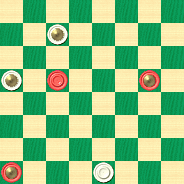
White to Play and Win
W:W31,K13,K6:BK29,K16,14.
Uncle Ben just sat quietly. Eventually Tommy cried himself out. He took a few deep breaths and gave Uncle Ben an embarrassed look.
"It's okay, Tommy. You have to express your grief. You can't just hold it in forever. Sometimes it's braver to cry than to try to act strong."
"I don't know how I can go to the championships, Uncle Ben," Tommy said. "It just doesn't seem right. Grandpa's funeral is going to be right in the middle of the competition."
It was true. The opening round was on Wednesday and the funeral was scheduled for Thursday morning. "How can I let Mom go to the funeral by herself?" Tommy asked. "I've just got to be there."
Uncle Ben took his time before answering. In a quiet voice, he said, "What does your mother say?"
"My mother says I've got to decide for myself, but she thinks I have an obligation to my team. The thing is, I think I have an obligation to my mom."
"Indeed, you do, Tommy, although that obligation may not be quite what you think. But you're leaving out the most important question of all."
Tommy look puzzled. "I don't understand, Uncle Ben. What other question is there?"
"The question you need to ask, Tommy, is, what would your grandfather have wanted you to do?"
Tommy smiled. "Gramps and I talked about it a lot," he said. "Gramps was really proud of me and wanted my team to take the championship this year. He thought we had a really good shot at it." Tommy's smile quickly vanished and he felt near tears again. "But he won't see it now ... it just doesn't seem to matter any more."
"Oh, it does matter, Tommy. It matters quite a bit. But you really didn't answer the question. What would your grandfather want you to do?"
"Well ... he was always telling me things like 'life is for the living' and saying I would only be young once and not to miss out on anything. I never really understood all of it, I guess."
"Do you understand a little more of it now?"
Tommy thought for a moment. "You mean now that he's gone? Actually, Uncle Ben, I think he was trying to tell me something."
"And what might that be?"
"That he was old and he wouldn't be around forever, and that life would go on?"
"Very good. And now, can you answer my question?"
"He'd want me to go, wouldn't he? He'd want me to go and play my best and bring home the trophy."
Uncle Ben sat back in his chair and didn't say anything.
"But what about my Mom?" Tommy asked. "Shouldn't I be with her?"
"The hardest time for your Mom, Tommy, will be when the funeral is over and everyone has gone home. You'll be there with her then, when she really needs you the most." Uncle Ben paused. "Now, I can't tell you what to do. You have to decide for yourself, and we'll all respect your decision. That's all I'm going to say, so are you ready for some lemonade now?"
Tommy sat up straight and nodded. "Yes, please, I'd like that, Uncle Ben. Thank you. And I think we'd better get down to my lesson. I've got a championship to win, you know!"
Uncle Ben smiled and reached for the icy pitcher of fresh lemonade.

Editor's Note: Clicking on Read More will take you to the problem solution, a sample game, many more examples of the problem's theme, as well as additional commentary.![]()
Capers on the Kelso, Part 6

Finally, we go to the source. Shown above is the River Tweed in the Kelso area of Scotland, and as we all know, the 10-15 Kelso opening is named for this region.
We continue this extended series on the Kelso with Willie's "Variation 2," as presented in his famed and famous Tricks Traps & Shots of the Checkerboard. Variation 2 is reached as follows. (Annotations are shown in previous columns in this series.)
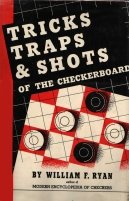
| 10-15 | 21-17 | 24-20 | |
| 22-18 | 4-8 | 1-6 | |
| 15-22 | 17-13 | 28-24 | |
| 25-18 | 9-14 | 8-11---1 | |
| 11-15 | 29-25 | 32-28---A | |
| 18-11 | 6-10 | 14-17---B,C | |
| 8-15 |
A---"Forms a position made famous by American Champion A. J. Heffner of Boston, who published much fine play on it years ago. The ramifications of this formation should be mastered by every aspiring player, as it has been the nemesis of many headliners in the checker firmament."
1---Willie has previously noted that this is a very weak move. 15-19 is really the only way to go for Black.
Notes B and C are shown in the solution.
The last move, 14-17, is critical. What if Black plays 15-18? How about 14-18? It turns out that both of these moves lose.
BLACK
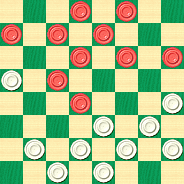
WHITE
White to Play and Win
W:W31,30,28,27,26,25,24,23,20,13:B18,14,12,11,10,7,6,5,3,2.
BLACK
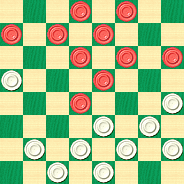
WHITE
White to Play and Win
W:W31,30,28,27,26,25,24,23,20,13:B18,15,12,11,10,7,6,5,3,2.
So, you have two problems to solve. The first is easier than the second, especially as our computer analysis explored some improved play in the second problem. See what you can do, and then go to the source by clicking on Read More to see the solutions.![]()
A Textbook Win

"Hitting the books" is something we were admonished to do throughout our academic years, from grade school all the way through graduate school. There was certainly a lot of knowledge in those weighty textbooks, and though acquiring that knowledge wasn't always an enjoyable experience, hitting the books usually paid off.
The same is true with checkers, although we have to admit to enjoying checker study a little more than we enjoyed things like tensor analysis or the works of Kant in the original German. Besides, if we want to be good at checkers, book learning is a necessity, not an option.
Today's study definitely could have come from a checker text.
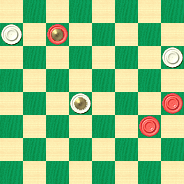
BLACK
Black to Play and Win
B:W28,21,K15:BK27,13,9.
White has just played the losing 19-15. What should White have played? And more importantly, how can Black win? This problem is another example of the beautiful subtlety of checkers.
It's only fair to warn you that it will take Black a little while to win this. But the process is no more than a logical and methodical application of textbook principles.
Write a chapter in your own checker textbook by solving this problem, then click on Read More to see our own annotated solution.![]()
Mulholland Drive
We had a little more trouble than usual with today's Checker School theme.
There was a very famous engineer, William Mulholland, but the surname's spelling isn't the same as the name in our theme. Mr. Mulholland designed and directed the construction of the 233-mile long Los Angeles aqueduct, which opened in 1913. Mulholland Drive and other places around Los Angeles are named after him. His career had an unfortunate ending after the deadly collapse of the St. Francis Dam in 1928.
But what about Mr. Lucas? The name is common enough, and we uncovered numerous engineers and engineering firms bearing that name.
There is at least one modern-day person named Lucas Mullholland, with that exact spelling, but for privacy reasons we won't publish a photo or travel any further in that direction.
Of course, there's the famed 2001 Mulholland Drive movie, as shown above.
What has all of this to do with checkers? We don't know, but it's almost a certainty that William Mulholland at least knew how to play the game.
Today's study consists of two problems based on a single diagram. It all comes down to who moves first.
WHITE
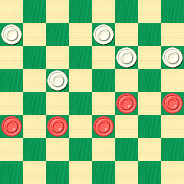
BLACK
Black to Play and Draw
White to Play, Black Wins
B:W28,26,22,21,19:B14,13,12,11,10.
W:W28,26,22,21,19:B14,13,12,11,10.
This is an excellent and subtle study, and it's well worth your time. See if you can engineer the solutions, then click on Read More to see notes, commentary, analysis, and sample games.![]()
Not Exactly a Speed Problem
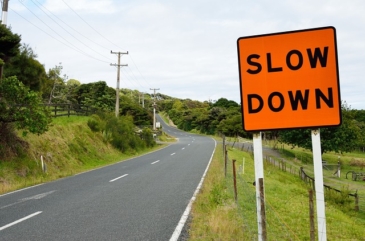
Today's problem was sent by regular contributors Lloyd and Josh Gordon of Toronto, Ontario. We were going to feature it as a speed problem, and indeed there are some speed problem aspects here. But the problem goes deeper than the first few moves, as you'll soon see.
So this month, we'll spare you the Javascript clock and let you take as much time as you need. We don't doubt that you'll see the "speed" part pretty quickly. After that, you'll likely need to think it through.
Here's the position.
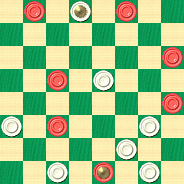
WHITE
White to Play and Win
W:W32,30,27,24,21,15,K2:BK31,22,20,14,12,3,1.
It's an interesting study. Take all the time you need, then click on Read More to see the solution.![]()

